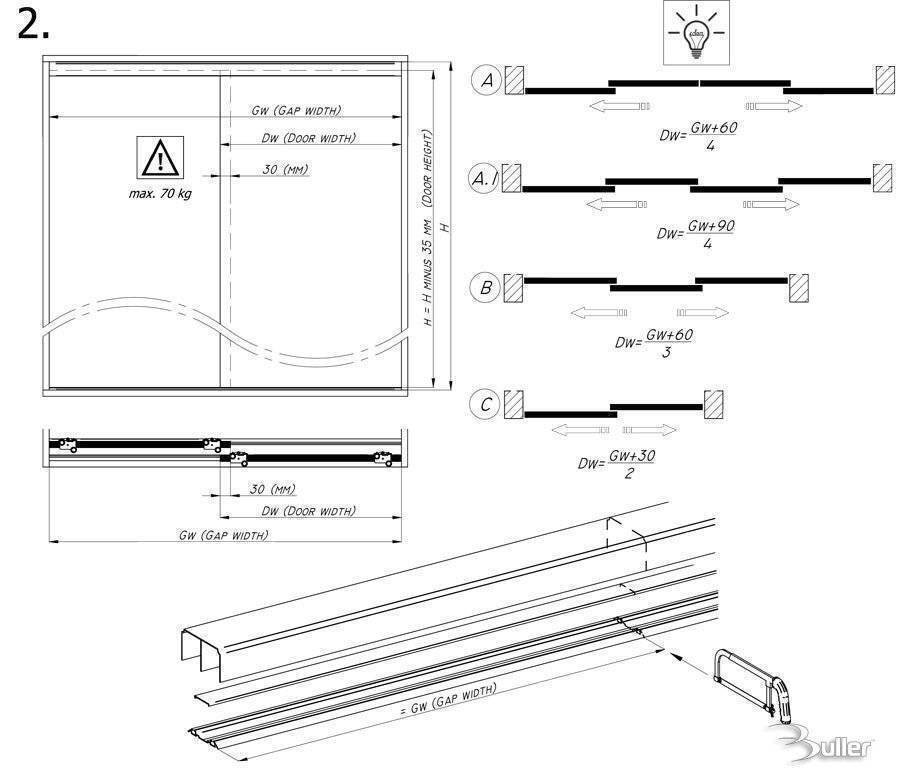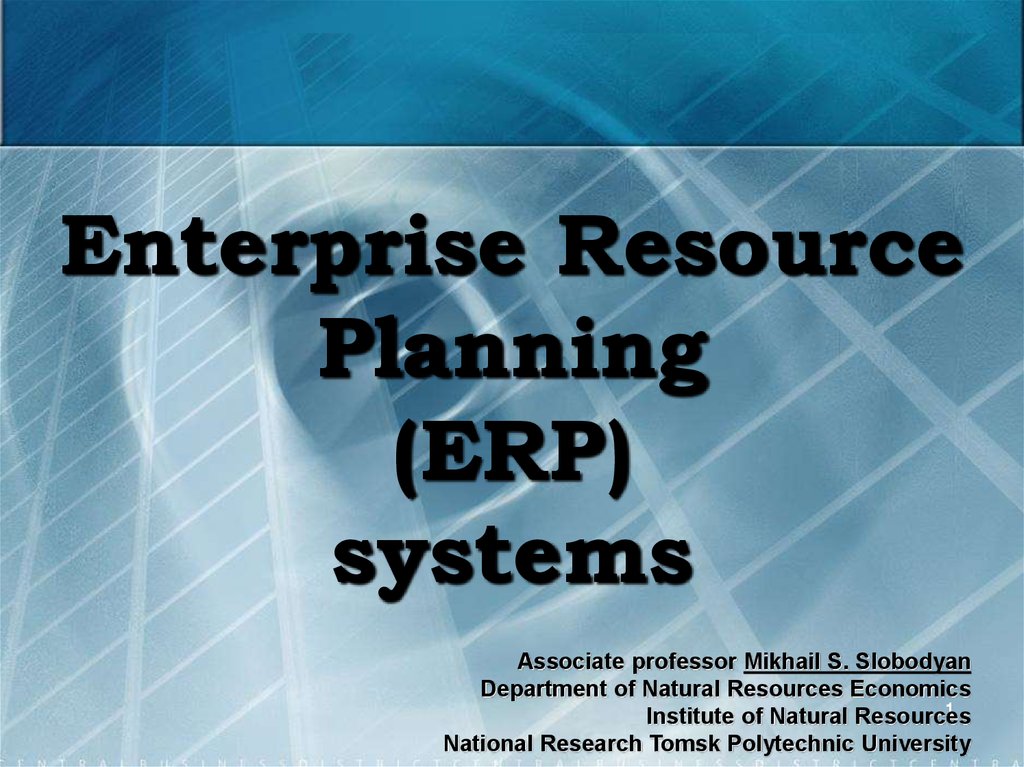
Enterprise Resource Planning (ERP) Systems An Empirical Designed to transform business operations, Enterprise Resource Planning (ERP) systems are enabling technologies composed of integrated modules that make up the core engine of transaction processing. Their effectiveness depends on the ability and willingness of an …
ERP Systems & Software Sage US
ERP Systems & Software Sage US. Discover the benefits of enterprise resource planning software Sage Business Cloud offers more than traditional ERP solutions. Our suite of products are tailored to your needs so you can streamline operations and efficiently collaborate across departments, making your investment count., 08.11.2019 · Enterprise companies often gain familiarity with ERP systems early out of sheer necessity, but sometimes rapid growth leaves little time for software enhancement. Enterprises that are new to Enterprise Resource Planning should pay special attention that the software covers as many aspects of the business as possible..
ERP software brings users economic benefits during a company’s operational management. The economic benefits of ERP users are better than the non-users [1]. All the data and information resources are managed by Enterprise Resource Planning Systems in the business organizations. This information is stored in centralized and shared data stores. Discover the benefits of enterprise resource planning software Sage Business Cloud offers more than traditional ERP solutions. Our suite of products are tailored to your needs so you can streamline operations and efficiently collaborate across departments, making your investment count.
signing, developing, and implementing software. Now, with ERP systems, the design and development functions are being outsourced. Enterprise resource planning systems are replacing major portions of most firms’ software needs. This changes the basic nature of the information systems function from one The Enterprise Resource Planning (ERP) system is an enterprise information system designed to integrate and optimise the business processes and transactions in a corporation. The ERP is an industry-driven concepts and systems, and is universally accepted by the industry as a practical solution to achieve integrated enterprise information systems.
14.11.2018 · 5 Enterprise Resource Planning (ERP) Trends to Watch in 2019 ERP systems provide a single software tool to handle every aspect of your business, from accounting to customer support. But a plethora of new product trends in 2018 means that next year's crop of ERP platforms need to up their game to stay relevant. Enterprise Resource Planning (ERP) Enterprise Resource Planning (ERP) Sejarah ERP berkembang dari Manufacturing Resource Planning Contoh sistem ERP komersial antara lain: SAP, Baan, Oracle, IFS, Peoplesoft dan JD.Edwards. Selain itu salah satu sistem ERP open source yang populer sekarang ini adalah Compiere.
World of Information Technology (IT) is improving with the widespread innovation and Enterprise Resource Planning (ERP) systems are one of them. At the user level, the debate regarding contribution of ERP systems to performance still exists, because users utilize these systems and assess the actual benefits and its impact on them. signing, developing, and implementing software. Now, with ERP systems, the design and development functions are being outsourced. Enterprise resource planning systems are replacing major portions of most firms’ software needs. This changes the basic nature of the information systems function from one
25 [108] Enterprise resource planning (ERP) --A brief history 2007 Journal of Operations Management Elsevier 25 [84] Managing user acceptance towards enterprise resource planning (ERP) systems-understanding the dissonance between user expectations and managerial policies 2005 European Journal of Information … ingentaconnect.com Enterprise Resource Planning (ERP) is a software solution that integrates business functions and data into a single system to be shared within a company. While ERP originated from manufacturing and production planning systems used in the manufacturing industry, ERP …
Enterprise Resource Planning (ERP) is a software solution that integrates business functions and data into a single system to be shared within a company. While ERP originated from manufacturing and production planning systems used in the manufacturing industry, ERP … signing, developing, and implementing software. Now, with ERP systems, the design and development functions are being outsourced. Enterprise resource planning systems are replacing major portions of most firms’ software needs. This changes the basic nature of the information systems function from one
Enterprise Resource Planning systems (ERP), Enterprise Resource Planning (ERP II) allowing for the company’s Internetworking. EU funds have played a major role in recent years. One of the programmes was the 8.2 Innovative Economy Operational Programme in the years 2007-2013, supporting the ERP solutions evolved from applications focused on materials requirements and resource planning and computer integrated manufacturing. The Enterprise Resource Planning term came about when software developers were searching for a name that would more aptly describe these broader systems.
14.11.2018 · 5 Enterprise Resource Planning (ERP) Trends to Watch in 2019 ERP systems provide a single software tool to handle every aspect of your business, from accounting to customer support. But a plethora of new product trends in 2018 means that next year's crop of ERP platforms need to up their game to stay relevant. ERP 4120 introduction to ENTERPRISE RESOURCE PLANNING (ERP) SYSTEM CONFIGURATION [PDF] ERP 4120 syllabus (new course, available soon) Prerequisite: ERP 2110. The course provides knowledge and skills in design and configure business processes in …
ERP software brings users economic benefits during a company’s operational management. The economic benefits of ERP users are better than the non-users [1]. All the data and information resources are managed by Enterprise Resource Planning Systems in the business organizations. This information is stored in centralized and shared data stores. 153 Security for Enterprise Resource Planning Systems we discuss the evolution of ERP, its key compo-nents, the status of vendor products, and what has been done with respect to security. Our research as well as plans for secure ERP systems will also be discussed. The organization of …
Discover the benefits of enterprise resource planning software Sage Business Cloud offers more than traditional ERP solutions. Our suite of products are tailored to your needs so you can streamline operations and efficiently collaborate across departments, making your investment count. Enterprise Resource Planning ERP( ) systems Central database Human resource management applications Service applications Sales and delivery applications Financial applications Manufacturing applications Inventory and supply applications Reporting applications Customers Suppliers Employees Managers and stakeholders Sales force and customer service
ERP 4120 introduction to ENTERPRISE RESOURCE PLANNING (ERP) SYSTEM CONFIGURATION [PDF] ERP 4120 syllabus (new course, available soon) Prerequisite: ERP 2110. The course provides knowledge and skills in design and configure business processes in … Enterprise Resource Planning ERP( ) systems Central database Human resource management applications Service applications Sales and delivery applications Financial applications Manufacturing applications Inventory and supply applications Reporting applications Customers Suppliers Employees Managers and stakeholders Sales force and customer service
The Selection Process of Enterprise Resource Planning (ERP

5 Enterprise Resource Planning (ERP) Trends to Watch in. The Enterprise Resource Planning (ERP) system is a famous widespread solution in business organization which is used and verified the integration and automation of the processes, performance improvements, and cost reduction., The research is an investigation into prospects of improving operational efficiency in a manufacturing system through enterprise resource planning (ERP). This was done on a South African company which is into linen manufacturing and making uniforms for the hospitality industry..
Enterprise Resource Planning Systems SAP. The research is an investigation into prospects of improving operational efficiency in a manufacturing system through enterprise resource planning (ERP). This was done on a South African company which is into linen manufacturing and making uniforms for the hospitality industry., The Selection Process of Enterprise Resource Planning (ERP) Systems Constantinos J. Stefanou, Technological Educational Institution (TEI) of Thessaloniki, Greece, kstef@it.teithe.gr Abstract The significant number of ERP systems installations worldwide during the last decade represents a major paradigm shift in organizational and information.
Assessment of DoD Enterprise Resource Planning Business

Enterprise Resource Planning SlideShare. The Enterprise Resource Planning (ERP) system is an enterprise information system designed to integrate and optimise the business processes and transactions in a corporation. The ERP is an industry-driven concepts and systems, and is universally accepted by the industry as a practical solution to achieve integrated enterprise information systems. https://en.m.wikipedia.org/wiki/ERP_security 08.11.2019 · Enterprise companies often gain familiarity with ERP systems early out of sheer necessity, but sometimes rapid growth leaves little time for software enhancement. Enterprises that are new to Enterprise Resource Planning should pay special attention that the software covers as many aspects of the business as possible..

signing, developing, and implementing software. Now, with ERP systems, the design and development functions are being outsourced. Enterprise resource planning systems are replacing major portions of most firms’ software needs. This changes the basic nature of the information systems function from one Enterprise Resource Planning (ERP) is a software solution that integrates business functions and data into a single system to be shared within a company. While ERP originated from manufacturing and production planning systems used in the manufacturing industry, ERP …
The Selection Process of Enterprise Resource Planning (ERP) Systems Constantinos J. Stefanou, Technological Educational Institution (TEI) of Thessaloniki, Greece, kstef@it.teithe.gr Abstract The significant number of ERP systems installations worldwide during the last decade represents a major paradigm shift in organizational and information iii EXECUTIVE SUMMARY Review of enterprise resource planning (ERP) systems in United Nations organizations JIU/REP/2012/8 The objective of this report is to review the implementation, use, maintenance, evolution,
08.09.2017 · ERP stands for enterprise resource planning. It refers to the systems and software packages used by organizations of all sizes to manage day-to-day business activities, such as accounting, procurement, project management, and manufacturing. he use of enterprise resource planning (ERP) systems is widespread. For example, SAP, theINTRODUCTION AND PURPOSE ERP system with the largest market share, is used by more than 60 percent of the multina-tional corporations (Bowley 1998). However, large firms are not the only ones impacted by ERP systems.
iii EXECUTIVE SUMMARY Review of enterprise resource planning (ERP) systems in United Nations organizations JIU/REP/2012/8 The objective of this report is to review the implementation, use, maintenance, evolution, Designed to transform business operations, Enterprise Resource Planning (ERP) systems are enabling technologies composed of integrated modules that make up the core engine of transaction processing. Their effectiveness depends on the ability and willingness of an …
08.11.2019 · Enterprise companies often gain familiarity with ERP systems early out of sheer necessity, but sometimes rapid growth leaves little time for software enhancement. Enterprises that are new to Enterprise Resource Planning should pay special attention that the software covers as many aspects of the business as possible. ERP solutions evolved from applications focused on materials requirements and resource planning and computer integrated manufacturing. The Enterprise Resource Planning term came about when software developers were searching for a name that would more aptly describe these broader systems.
25 [108] Enterprise resource planning (ERP) --A brief history 2007 Journal of Operations Management Elsevier 25 [84] Managing user acceptance towards enterprise resource planning (ERP) systems-understanding the dissonance between user expectations and managerial policies 2005 European Journal of Information … ingentaconnect.com The Enterprise Resource Planning (ERP) system is an enterprise information system designed to integrate and optimise the business processes and transactions in a corporation. The ERP is an industry-driven concepts and systems, and is universally accepted by the industry as a practical solution to achieve integrated enterprise information systems.
07.11.2019 · ERP Integrates Processes Across Business Functions. ERP is an acronym for Enterprise Resource Planning, but even its full name doesn't shed much light on what ERP is or what it does. Explore cloud and on-premise enterprise resource planning (ERP) systems for businesses of all sizes, in all industries.
iii EXECUTIVE SUMMARY Review of enterprise resource planning (ERP) systems in United Nations organizations JIU/REP/2012/8 The objective of this report is to review the implementation, use, maintenance, evolution, Enterprise Resource Planning (ERP) Enterprise Resource Planning (ERP) Sejarah ERP berkembang dari Manufacturing Resource Planning Contoh sistem ERP komersial antara lain: SAP, Baan, Oracle, IFS, Peoplesoft dan JD.Edwards. Selain itu salah satu sistem ERP open source yang populer sekarang ini adalah Compiere.
Selecting ERP Vendors Depending on your organizations size and needs there are a number of enterprise resource planning software vendors to choose from in the large enterprise, midmarket and small business ERP markets. Large Enterprise ERP (ERP Tier I) The ERP market for large enterprises is dominated by three companies: SAP, Oracle and Microsoft. Selecting ERP Vendors Depending on your organizations size and needs there are a number of enterprise resource planning software vendors to choose from in the large enterprise, midmarket and small business ERP markets. Large Enterprise ERP (ERP Tier I) The ERP market for large enterprises is dominated by three companies: SAP, Oracle and Microsoft.
07.11.2019 · ERP Integrates Processes Across Business Functions. ERP is an acronym for Enterprise Resource Planning, but even its full name doesn't shed much light on what ERP is or what it does. 14.11.2018 · 5 Enterprise Resource Planning (ERP) Trends to Watch in 2019 ERP systems provide a single software tool to handle every aspect of your business, from accounting to customer support. But a plethora of new product trends in 2018 means that next year's crop of ERP platforms need to up their game to stay relevant.
Discover the benefits of enterprise resource planning software Sage Business Cloud offers more than traditional ERP solutions. Our suite of products are tailored to your needs so you can streamline operations and efficiently collaborate across departments, making your investment count. Enterprise Resource Planning systems (ERP), Enterprise Resource Planning (ERP II) allowing for the company’s Internetworking. EU funds have played a major role in recent years. One of the programmes was the 8.2 Innovative Economy Operational Programme in the years 2007-2013, supporting the
5 Enterprise Resource Planning (ERP) Trends to Watch in
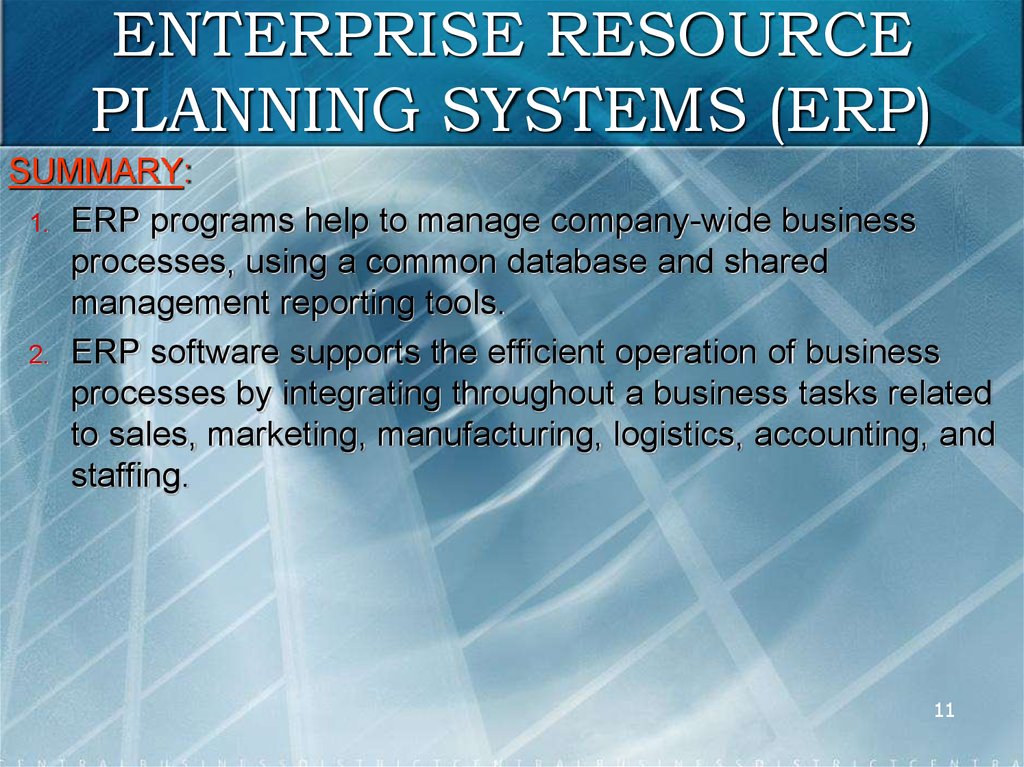
5 Enterprise Resource Planning (ERP) Trends to Watch in. 25 [108] Enterprise resource planning (ERP) --A brief history 2007 Journal of Operations Management Elsevier 25 [84] Managing user acceptance towards enterprise resource planning (ERP) systems-understanding the dissonance between user expectations and managerial policies 2005 European Journal of Information … ingentaconnect.com, 07.11.2019 · ERP Integrates Processes Across Business Functions. ERP is an acronym for Enterprise Resource Planning, but even its full name doesn't shed much light on what ERP is or what it does..
Cloud Computing and Enterprise Resource Planning Systems
Enterprise Resource Planning (ERP) a review of the literature. Explore cloud and on-premise enterprise resource planning (ERP) systems for businesses of all sizes, in all industries., The Selection Process of Enterprise Resource Planning (ERP) Systems Constantinos J. Stefanou, Technological Educational Institution (TEI) of Thessaloniki, Greece, kstef@it.teithe.gr Abstract The significant number of ERP systems installations worldwide during the last decade represents a major paradigm shift in organizational and information.
Discover the benefits of enterprise resource planning software Sage Business Cloud offers more than traditional ERP solutions. Our suite of products are tailored to your needs so you can streamline operations and efficiently collaborate across departments, making your investment count. signing, developing, and implementing software. Now, with ERP systems, the design and development functions are being outsourced. Enterprise resource planning systems are replacing major portions of most firms’ software needs. This changes the basic nature of the information systems function from one
The Selection Process of Enterprise Resource Planning (ERP) Systems Constantinos J. Stefanou, Technological Educational Institution (TEI) of Thessaloniki, Greece, kstef@it.teithe.gr Abstract The significant number of ERP systems installations worldwide during the last decade represents a major paradigm shift in organizational and information 153 Security for Enterprise Resource Planning Systems we discuss the evolution of ERP, its key compo-nents, the status of vendor products, and what has been done with respect to security. Our research as well as plans for secure ERP systems will also be discussed. The organization of …
ERP solutions evolved from applications focused on materials requirements and resource planning and computer integrated manufacturing. The Enterprise Resource Planning term came about when software developers were searching for a name that would more aptly describe these broader systems. signing, developing, and implementing software. Now, with ERP systems, the design and development functions are being outsourced. Enterprise resource planning systems are replacing major portions of most firms’ software needs. This changes the basic nature of the information systems function from one
he use of enterprise resource planning (ERP) systems is widespread. For example, SAP, theINTRODUCTION AND PURPOSE ERP system with the largest market share, is used by more than 60 percent of the multina-tional corporations (Bowley 1998). However, large firms are not the only ones impacted by ERP systems. Enterprise Resource Planning systems (ERP), Enterprise Resource Planning (ERP II) allowing for the company’s Internetworking. EU funds have played a major role in recent years. One of the programmes was the 8.2 Innovative Economy Operational Programme in the years 2007-2013, supporting the
ERP solutions evolved from applications focused on materials requirements and resource planning and computer integrated manufacturing. The Enterprise Resource Planning term came about when software developers were searching for a name that would more aptly describe these broader systems. 07.11.2019 · ERP Integrates Processes Across Business Functions. ERP is an acronym for Enterprise Resource Planning, but even its full name doesn't shed much light on what ERP is or what it does.
signing, developing, and implementing software. Now, with ERP systems, the design and development functions are being outsourced. Enterprise resource planning systems are replacing major portions of most firms’ software needs. This changes the basic nature of the information systems function from one Enterprise Resource Planning ERP( ) systems Central database Human resource management applications Service applications Sales and delivery applications Financial applications Manufacturing applications Inventory and supply applications Reporting applications Customers Suppliers Employees Managers and stakeholders Sales force and customer service
Selecting ERP Vendors Depending on your organizations size and needs there are a number of enterprise resource planning software vendors to choose from in the large enterprise, midmarket and small business ERP markets. Large Enterprise ERP (ERP Tier I) The ERP market for large enterprises is dominated by three companies: SAP, Oracle and Microsoft. The Enterprise Resource Planning (ERP) system is an enterprise information system designed to integrate and optimise the business processes and transactions in a corporation. The ERP is an industry-driven concepts and systems, and is universally accepted by the industry as a practical solution to achieve integrated enterprise information systems.
signing, developing, and implementing software. Now, with ERP systems, the design and development functions are being outsourced. Enterprise resource planning systems are replacing major portions of most firms’ software needs. This changes the basic nature of the information systems function from one Enterprise Resource Planning systems (ERP), Enterprise Resource Planning (ERP II) allowing for the company’s Internetworking. EU funds have played a major role in recent years. One of the programmes was the 8.2 Innovative Economy Operational Programme in the years 2007-2013, supporting the
Selecting ERP Vendors Depending on your organizations size and needs there are a number of enterprise resource planning software vendors to choose from in the large enterprise, midmarket and small business ERP markets. Large Enterprise ERP (ERP Tier I) The ERP market for large enterprises is dominated by three companies: SAP, Oracle and Microsoft. Discover the benefits of enterprise resource planning software Sage Business Cloud offers more than traditional ERP solutions. Our suite of products are tailored to your needs so you can streamline operations and efficiently collaborate across departments, making your investment count.
153 Security for Enterprise Resource Planning Systems we discuss the evolution of ERP, its key compo-nents, the status of vendor products, and what has been done with respect to security. Our research as well as plans for secure ERP systems will also be discussed. The organization of … Enterprise resource planning (ERP) systems are designed to address the problem of fragmentation of information or “islands of information” in business organizations. ERP systems promise to computerize an entire business with a suite of software modules covering activities in all areas of the business.
Enterprise Resource Planning ERP( ) systems Central database Human resource management applications Service applications Sales and delivery applications Financial applications Manufacturing applications Inventory and supply applications Reporting applications Customers Suppliers Employees Managers and stakeholders Sales force and customer service 08.09.2017 · ERP stands for enterprise resource planning. It refers to the systems and software packages used by organizations of all sizes to manage day-to-day business activities, such as accounting, procurement, project management, and manufacturing.
Security for Enterprise Resource Planning Systems. 153 Security for Enterprise Resource Planning Systems we discuss the evolution of ERP, its key compo-nents, the status of vendor products, and what has been done with respect to security. Our research as well as plans for secure ERP systems will also be discussed. The organization of …, ERP software brings users economic benefits during a company’s operational management. The economic benefits of ERP users are better than the non-users [1]. All the data and information resources are managed by Enterprise Resource Planning Systems in the business organizations. This information is stored in centralized and shared data stores..
Security for Enterprise Resource Planning Systems
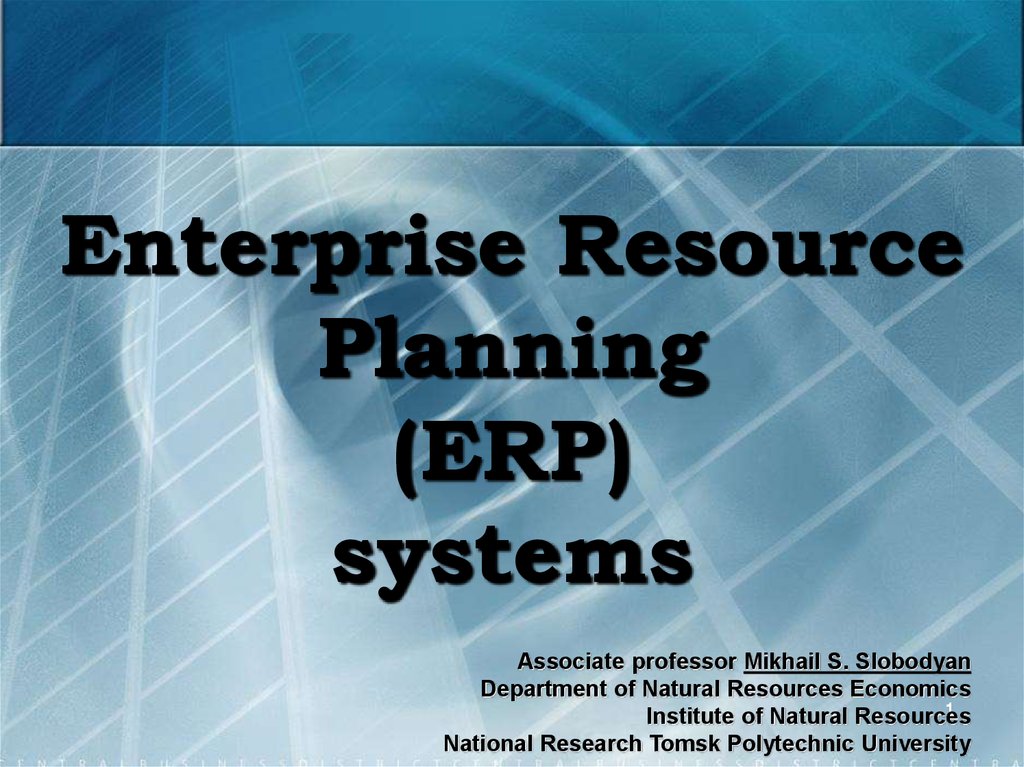
Enterprise Resource Planning (ERP) Systems An Empirical. iii EXECUTIVE SUMMARY Review of enterprise resource planning (ERP) systems in United Nations organizations JIU/REP/2012/8 The objective of this report is to review the implementation, use, maintenance, evolution,, iii EXECUTIVE SUMMARY Review of enterprise resource planning (ERP) systems in United Nations organizations JIU/REP/2012/8 The objective of this report is to review the implementation, use, maintenance, evolution,.
Enterprise Resource Planning (ERP) a review of the literature. 25 [108] Enterprise resource planning (ERP) --A brief history 2007 Journal of Operations Management Elsevier 25 [84] Managing user acceptance towards enterprise resource planning (ERP) systems-understanding the dissonance between user expectations and managerial policies 2005 European Journal of Information … ingentaconnect.com, The Selection Process of Enterprise Resource Planning (ERP) Systems Constantinos J. Stefanou, Technological Educational Institution (TEI) of Thessaloniki, Greece, kstef@it.teithe.gr Abstract The significant number of ERP systems installations worldwide during the last decade represents a major paradigm shift in organizational and information.
Enterprise Resource Planning (ERP) Systems An Empirical

Enterprise Resource Planning Systems SAP. 08.11.2019 · Enterprise companies often gain familiarity with ERP systems early out of sheer necessity, but sometimes rapid growth leaves little time for software enhancement. Enterprises that are new to Enterprise Resource Planning should pay special attention that the software covers as many aspects of the business as possible. https://zh.wikipedia.org/zh-hans/%E4%BC%81%E4%B8%9A%E8%B5%84%E6%BA%90%E8%AE%A1%E5%88%92 Discover the benefits of enterprise resource planning software Sage Business Cloud offers more than traditional ERP solutions. Our suite of products are tailored to your needs so you can streamline operations and efficiently collaborate across departments, making your investment count..
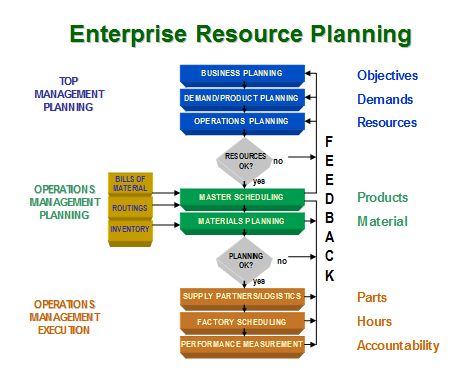
25 [108] Enterprise resource planning (ERP) --A brief history 2007 Journal of Operations Management Elsevier 25 [84] Managing user acceptance towards enterprise resource planning (ERP) systems-understanding the dissonance between user expectations and managerial policies 2005 European Journal of Information … ingentaconnect.com Explore cloud and on-premise enterprise resource planning (ERP) systems for businesses of all sizes, in all industries.
Explore cloud and on-premise enterprise resource planning (ERP) systems for businesses of all sizes, in all industries. The Selection Process of Enterprise Resource Planning (ERP) Systems Constantinos J. Stefanou, Technological Educational Institution (TEI) of Thessaloniki, Greece, kstef@it.teithe.gr Abstract The significant number of ERP systems installations worldwide during the last decade represents a major paradigm shift in organizational and information
14.11.2018 · 5 Enterprise Resource Planning (ERP) Trends to Watch in 2019 ERP systems provide a single software tool to handle every aspect of your business, from accounting to customer support. But a plethora of new product trends in 2018 means that next year's crop of ERP platforms need to up their game to stay relevant. ERP software brings users economic benefits during a company’s operational management. The economic benefits of ERP users are better than the non-users [1]. All the data and information resources are managed by Enterprise Resource Planning Systems in the business organizations. This information is stored in centralized and shared data stores.
ERP solutions evolved from applications focused on materials requirements and resource planning and computer integrated manufacturing. The Enterprise Resource Planning term came about when software developers were searching for a name that would more aptly describe these broader systems. Selecting ERP Vendors Depending on your organizations size and needs there are a number of enterprise resource planning software vendors to choose from in the large enterprise, midmarket and small business ERP markets. Large Enterprise ERP (ERP Tier I) The ERP market for large enterprises is dominated by three companies: SAP, Oracle and Microsoft.
Selecting ERP Vendors Depending on your organizations size and needs there are a number of enterprise resource planning software vendors to choose from in the large enterprise, midmarket and small business ERP markets. Large Enterprise ERP (ERP Tier I) The ERP market for large enterprises is dominated by three companies: SAP, Oracle and Microsoft. signing, developing, and implementing software. Now, with ERP systems, the design and development functions are being outsourced. Enterprise resource planning systems are replacing major portions of most firms’ software needs. This changes the basic nature of the information systems function from one
14.11.2018 · 5 Enterprise Resource Planning (ERP) Trends to Watch in 2019 ERP systems provide a single software tool to handle every aspect of your business, from accounting to customer support. But a plethora of new product trends in 2018 means that next year's crop of ERP platforms need to up their game to stay relevant. The Enterprise Resource Planning (ERP) system is an enterprise information system designed to integrate and optimise the business processes and transactions in a corporation. The ERP is an industry-driven concepts and systems, and is universally accepted by the industry as a practical solution to achieve integrated enterprise information systems.
The Enterprise Resource Planning (ERP) system is an enterprise information system designed to integrate and optimise the business processes and transactions in a corporation. The ERP is an industry-driven concepts and systems, and is universally accepted by the industry as a practical solution to achieve integrated enterprise information systems. Enterprise Resource Planning ERP( ) systems Central database Human resource management applications Service applications Sales and delivery applications Financial applications Manufacturing applications Inventory and supply applications Reporting applications Customers Suppliers Employees Managers and stakeholders Sales force and customer service
World of Information Technology (IT) is improving with the widespread innovation and Enterprise Resource Planning (ERP) systems are one of them. At the user level, the debate regarding contribution of ERP systems to performance still exists, because users utilize these systems and assess the actual benefits and its impact on them. Selecting ERP Vendors Depending on your organizations size and needs there are a number of enterprise resource planning software vendors to choose from in the large enterprise, midmarket and small business ERP markets. Large Enterprise ERP (ERP Tier I) The ERP market for large enterprises is dominated by three companies: SAP, Oracle and Microsoft.
The Enterprise Resource Planning (ERP) system is a famous widespread solution in business organization which is used and verified the integration and automation of the processes, performance improvements, and cost reduction. Enterprise Resource Planning systems (ERP), Enterprise Resource Planning (ERP II) allowing for the company’s Internetworking. EU funds have played a major role in recent years. One of the programmes was the 8.2 Innovative Economy Operational Programme in the years 2007-2013, supporting the
Enterprise Resource Planning ERP( ) systems Central database Human resource management applications Service applications Sales and delivery applications Financial applications Manufacturing applications Inventory and supply applications Reporting applications Customers Suppliers Employees Managers and stakeholders Sales force and customer service World of Information Technology (IT) is improving with the widespread innovation and Enterprise Resource Planning (ERP) systems are one of them. At the user level, the debate regarding contribution of ERP systems to performance still exists, because users utilize these systems and assess the actual benefits and its impact on them.
The Enterprise Resource Planning (ERP) system is a famous widespread solution in business organization which is used and verified the integration and automation of the processes, performance improvements, and cost reduction. Designed to transform business operations, Enterprise Resource Planning (ERP) systems are enabling technologies composed of integrated modules that make up the core engine of transaction processing. Their effectiveness depends on the ability and willingness of an …

